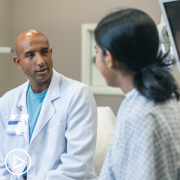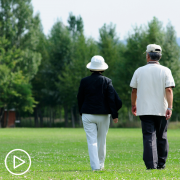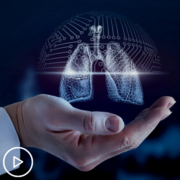What Are the Barriers to Lung Cancer Care?
What Are the Barriers to Lung Cancer Care? from Patient Empowerment Network on Vimeo.
What are some barriers to lung cancer care? Experts Dr. Nicole Rochester and Dr. Olugbenga Okusanya discuss factors that impact lung cancer care and some ways that care access can be improved for better care.
See More from Best Lung Cancer Care No Matter Where You Live
Related Resource:

|

|

|
Transcript:
Dr. Nicole Rochester:
We know that there are many factors that can negatively impact outcomes for patients and families facing a lung cancer diagnosis, including things like social stigma for smoking, geographic location, socioeconomic status, insurance and access to care, financial hardships and access to transportation. So, my question to you, Dr. Okusanya is, what are some of the barriers that both lung cancer patients and their care partners face when they are seeking care?
Dr. Olugbenga Okusanya:
First of all, thank you very much for putting a spotlight on lung cancer care, we really need more people to help us treat this really terrible disease.
There are a number of barriers for our patients in order to get the best care possible. Number one, we actually find this diagnosis, we find that a lot of patients, have long nodules that have been seen because maybe they got a chest X-ray or a CAT scan for some other reason, and maybe they don’t get followed up on because they don’t have a steady source of healthcare, they don’t have a PCP or someone who regularly follows up on their health information. We have trouble also sometimes getting patients in the appropriate diagnostic studies that they need, oftentimes, we find patients that may show up in the hospital that have a significant problem and they may need a special kind of CAT scan or a biopsy, and they simply do not have the resources to get to said CAT scan or get to said biopsy, which is critical in making the appropriate diagnosis so we can get them to the right therapy. One of the biggest things that you mentioned is finding a specialist in terms of all aspects of lung cancer care, whether it is surgery, medical oncology, or radiation oncology, there are medical practitioners that mostly specialize in lung cancer care, and because of that, they’re going to have access to different resources, they’re going to think differently about the disease process and they’re going to approach each patient differently because of the disease process. So, finding someone who really thinks and works in the lung cancer space all the time, I think it’s a barrier to patients getting really good care.
We also find that one, cancer care has a lot of hurdles, apart from proper CAT scans, biopsies, work-ups, actual interventions, there are a lot of steps that patients have to go, to get from even just getting a diagnosis to getting treatment and having patients move through that period of time, which is we hope usually four to six weeks in a sort of step-by-step manner can be extremely eliminating. So we really are trying to condense those things so patients can meet all the specialists, they need to get all the tests that they need to get in maybe one or two concise visits and then get into care, and lastly, as you mentioned, not having access to what we call multidisciplinary conferences is a limitation because there are more and more nuanced ways that lung cancer is presenting and being treated, that needs to be discussed between a surgeon and radiation oncologists and the medical oncologists, preferably all in the same setting, all at the same time. So having access to those clinics where we can have a really high-level discussion about the best thing to do for a patient, I feel is a significant barrier, especially for our patients with advanced disease










